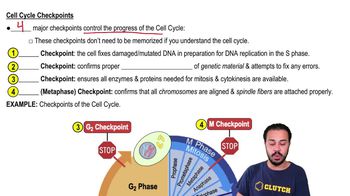Cell Cycle Regulation quiz Flashcards
 Back
BackTerms in this set (10)
What is the primary function of cell cycle checkpoints?
Cell cycle checkpoints control or regulate the cell cycle to ensure errors do not accumulate and the cell does not prematurely enter the next phase.
How many major checkpoints are there in the cell cycle?
There are four major checkpoints in the cell cycle.
What phase does the G1 checkpoint occur at the end of?
The G1 checkpoint occurs at the end of the G1 phase of interphase.
What is the main purpose of the G1 checkpoint?
The G1 checkpoint ensures that the DNA does not have any errors before it is replicated in the S phase.
What does the S checkpoint confirm?
The S checkpoint confirms the proper replication of the genetic material and attempts to fix any errors that may have occurred.
At which phase does the G2 checkpoint occur?
The G2 checkpoint occurs at the end of the G2 phase.
What does the G2 checkpoint ensure before the cell enters mitosis?
The G2 checkpoint ensures that all enzymes and proteins needed for mitosis and cytokinesis are available.
What is the main function of the M checkpoint during metaphase?
The M checkpoint confirms that all chromosomes are properly aligned in the middle of the cell and that spindle fibers are attached correctly.
What can result from malfunctioning cell cycle checkpoints?
Malfunctioning cell cycle checkpoints can lead to an unregulated cell cycle and potentially the development of cancer.
- which of the following properties is associated with a cyclin-dependent kinase (cdk)?Cyclin-dependent kinases (CDKs) are enzymes that, when activated by binding to cyclins, play a crucial role in regulating the cell cycle. They function by phosphorylating target proteins, which leads to progression through different phases of the cell cycle. CDKs are essential for the transition through cell cycle checkpoints, ensuring that the cell only progresses to the next phase when conditions are appropriate.


